 Petzlover
Petzlover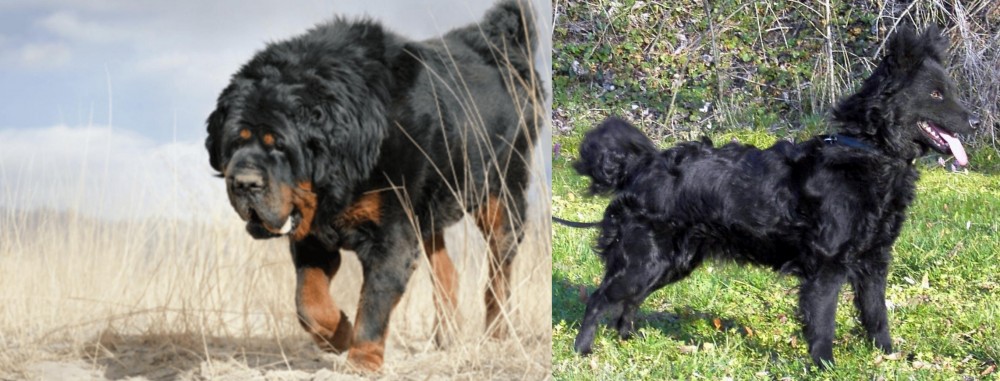 Gaddi Kutta is originated from India but Mudi is originated from Hungary. Gaddi Kutta may grow 24 cm / 10 inches higher than Mudi. Gaddi Kutta may weigh 30 kg / 67 pounds more than Mudi. Both Gaddi Kutta and Mudi has almost same life span. Both Gaddi Kutta and Mudi has almost same litter size. Gaddi Kutta requires High Maintenance. But Mudi requires Moderate Maintenance
Gaddi Kutta is originated from India but Mudi is originated from Hungary. Gaddi Kutta may grow 24 cm / 10 inches higher than Mudi. Gaddi Kutta may weigh 30 kg / 67 pounds more than Mudi. Both Gaddi Kutta and Mudi has almost same life span. Both Gaddi Kutta and Mudi has almost same litter size. Gaddi Kutta requires High Maintenance. But Mudi requires Moderate Maintenance
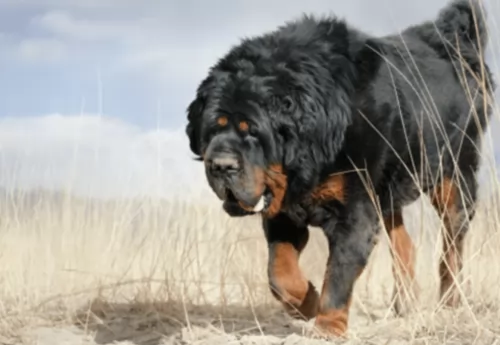 The Gaddi Kutta is mountain dog of the mastiff line from northern India. They are mostly found in the western Himalayas and Himachal Pradesh. It is also seen in Nepal and often named the Indian Panther Hound and the Mahidant Mastiff. They were bred to hunt but because of their strength and intelligence they are used to guard and herd goats and sheep. They are strong enough to defeat or scare off a panther or snow leopard and intelligent enough to work independently in finding strays and bringing them back to their pens. They have been known to protect herds of cattle from bears and leopards.3 or 4 of them working together can handle the guard duties for thousands of cattle.
The Gaddi Kutta is mountain dog of the mastiff line from northern India. They are mostly found in the western Himalayas and Himachal Pradesh. It is also seen in Nepal and often named the Indian Panther Hound and the Mahidant Mastiff. They were bred to hunt but because of their strength and intelligence they are used to guard and herd goats and sheep. They are strong enough to defeat or scare off a panther or snow leopard and intelligent enough to work independently in finding strays and bringing them back to their pens. They have been known to protect herds of cattle from bears and leopards.3 or 4 of them working together can handle the guard duties for thousands of cattle.
Their reputation precedes them – as ferocious and courageous, unmatched in their instincts to protect what is theirs. In the line of the Mastiffs and Molosser, the Gaddi is powerful and agile, and considered to be of ancient heritage though no one is sure what their origin is. The local myth is that dogs were crossed with tigers. It is more likely that dingo-like wild hounds from the Himalaya were crossed with the Tibetan Mastiff to create the Gaddi Kutti. Also found in Pakistan, most lines of the breed have been crossed with others including the German Shepard and the Bully Kutta. Outside of the Himalayas there are not many if any pure lines. The Gaddi Kutta is a good family dog if you socialize him as a puppy. He will be gentle, calm and intuitive with his family, but aggressive toward strangers and other dogs.
 Sometime between the 4th and 6th centuries, the Great Migration – a variety of dogs came to live in the Carpathian Mountains on the Great Hungarian Plain. This migration period brought sheepdogs and herders brought by shepherds. These dogs were of two sizes both small and large. The smaller ones were bred together – Pumi, Puli, and Mudi. Because of this, these breeds share the same history, with the Mundi being the oldest of them all.
Sometime between the 4th and 6th centuries, the Great Migration – a variety of dogs came to live in the Carpathian Mountains on the Great Hungarian Plain. This migration period brought sheepdogs and herders brought by shepherds. These dogs were of two sizes both small and large. The smaller ones were bred together – Pumi, Puli, and Mudi. Because of this, these breeds share the same history, with the Mundi being the oldest of them all.
The Mundi was finally separated from the other breeds about 1930 when Dr. Deszo Fenyesi began to breed them. It was in 1966 when the F.C.I. finally approved the standard for the breed. Still then as today, there were not many breeders developing the Mudi. They are working dogs – farm dogs – herders, guard dogs and ratters. He is also known as a tracker, with the majority of the breed living in Hungary.
As the Mudi was bred separately from the Pumi and the Puli, differences between the breeds became clear. Many Mudi are born with a stump or no tail at all. The Mudi is not a great dog for the first timer. He is stubborn, assertive and needs a lot of socialization and exercise. In 2004 breeders in the United States created the Mudi Club of America to preserve the breed and foster responsible ownership. This is a clever, active and keen breed, very loyal to his family but wary of strangers. The United Kennel Club recognized the breed in 2006.
In Hungary, these are still a breed of herding dogs capable of running 500 sheep at a time. They are versatile, courageous, intelligent and agile. They are great in obedience trials, agility, and flyball. In Finland and the United States, they also work as search and rescue dogs.
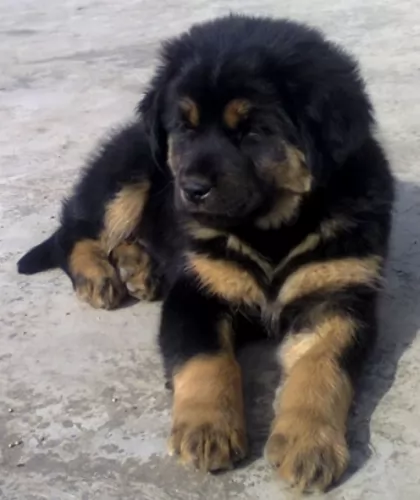 The Gaddi Kutta is a mastiff but he is athletic, has tremendous speed and stamina. He is muscular and deep-chested, leaner than most of the mastiff lines. Their ears can be either natural or cropped, on a very large head. One of the most important traits of the Gaddi Kutta is the massive, arched neck that protects them from predators. He is sturdy with a heavily feathered, thick tail curling over the back.
The Gaddi Kutta is a mastiff but he is athletic, has tremendous speed and stamina. He is muscular and deep-chested, leaner than most of the mastiff lines. Their ears can be either natural or cropped, on a very large head. One of the most important traits of the Gaddi Kutta is the massive, arched neck that protects them from predators. He is sturdy with a heavily feathered, thick tail curling over the back.
They are massive, wolf like dogs, fiery and huge but intelligent and faithful to their people. They are scary even when they are trying to be affectionate. The muzzle is strong, and the mane is thick. The Gaddi has long, heavy legs and very large feet that are feathered, making him even more intimidating.
There are two types of Gaddi Kutti – the longhaired and the shorthaired. The longhaired is the most common and has a fuller coat with long feathering on the tail, legs and chest and some feathering on the feet. They are all usually solid colors of yellow, fawn and cream or they could be piebald, brown or brindle. They have a woolly dense undercoat.
 This is a medium size dog with an almost square profile. They have erect ears on wedge-shaped heads. He is not a strong boned but medium boned. That square profile is based in large part on their very square stance. Their muzzle is about half the length of their head and they have what is considered a “dare devil” expression in their dark, almond-shaped eyes. The color of the eyes is important and must match with the color of the dog or the standard is not met.
This is a medium size dog with an almost square profile. They have erect ears on wedge-shaped heads. He is not a strong boned but medium boned. That square profile is based in large part on their very square stance. Their muzzle is about half the length of their head and they have what is considered a “dare devil” expression in their dark, almond-shaped eyes. The color of the eyes is important and must match with the color of the dog or the standard is not met.
Merle fur – brown, brown speckled, blue eyes.
Brown or gray-brown fur – Brown eyes
Gray fur – gray eyes
What is not acceptable is having yellow eyes and black fur; pink eyes and white fur. The lips, eye rims, and nose must all have the same pigmentation. This should be black in all but the brown and brown-grey dogs. These dogs have brown noses, eye rims, and lips. The tail can be almost anything from full to bob. All are considered to be natural lengths for a Mudi.
Their coat is self-cleaning and won’t mat. It is on the long side. In fact, a short, flat, smooth coat is a disqualification from the standard. The color of the coat ranges from white to brown to gray, gray-brown, merle, golden, cream and white. Very little markings of any kind are usual.
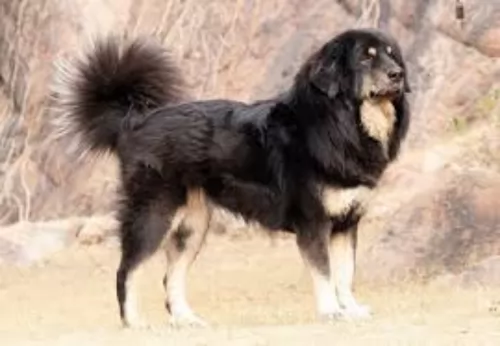 They are not always great with children, but they will protect own children in their family. Do not leave unattended.
They are not always great with children, but they will protect own children in their family. Do not leave unattended.
They have the ability to bring down a wolf or even a bear or snow leopard.
Because of his size, temperament and coat he is not very adaptable. He is good outside in a colder region and with a lot of land to roam, but not in a hot region or in an apartment.
This breed is very smart, learns quickly on his own.
 Yes, they are great with children and love being a part of a large family or “pack”.
Yes, they are great with children and love being a part of a large family or “pack”.
They are extremely versatile and great at herding and guarding.
They are adaptable if you are. They don’t need to live in the country, but they need space to run and play.
They are highly intelligent but a little stubborn. Their ability to learn is high but you have to be the boss.
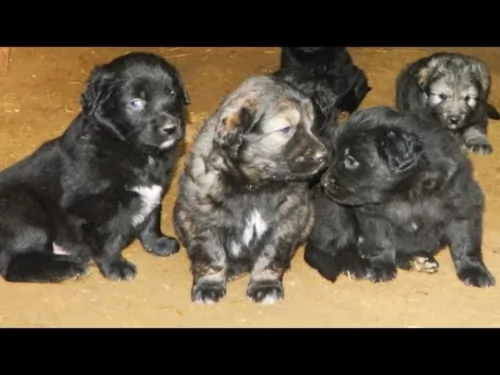 The breed is prone to obesity if they do not get enough exercise or a decent diet.
The breed is prone to obesity if they do not get enough exercise or a decent diet.
 The Mudi does face several of the problems that medium to large dogs often face and some eye issues as well.
The Mudi does face several of the problems that medium to large dogs often face and some eye issues as well.
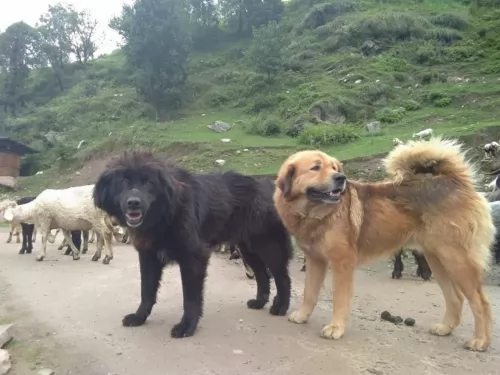 Should feed a high quality dry puppy food for large dogs. Give 1-2 cups per day split into 2-3 meals.
Should feed a high quality dry puppy food for large dogs. Give 1-2 cups per day split into 2-3 meals.
Again you want to feed high quality dry adult dog food for large dogs. Give 3-4 cups per day split into 2 meals. Watch for obesity and if your Gaddi Kutta is gaining too much weight, cut back.
The Gaddi Kutti seems to be immune to the most common of canine diseases.
This is a breed of very large dogs that need daily exercise by walking and running. However, since they have been fairly isolated in India and the Himalayas, he has not been exposed to organized dog play and exercise such as agility, dock jumping or field trials. He would probably succeed at all three.
 The Mudi needs a high quality, medium breed puppy dry food and should be fed 3 or 4 times a day for a total of 1 and ½ to 2 cups.
The Mudi needs a high quality, medium breed puppy dry food and should be fed 3 or 4 times a day for a total of 1 and ½ to 2 cups.
The adult should be fed at least twice a day with an adult medium breed high-quality dry dog food. Don’t overfeed as the breed can have a tendency toward obesity.
They have great stamina and agility.
This is a working dog and like most herding dogs, they need a job and a lot of activity. Long walks every day and either a large yard or visits to a dog park. Involve them in herding activities or Barn Hunt if you can. Playing is their way of working when they are not herding real animals. So, if you want this breed, be sure you have time for playing with them. They are great at agility, flyball, obedience, frisbee trials, tracking and of course herding